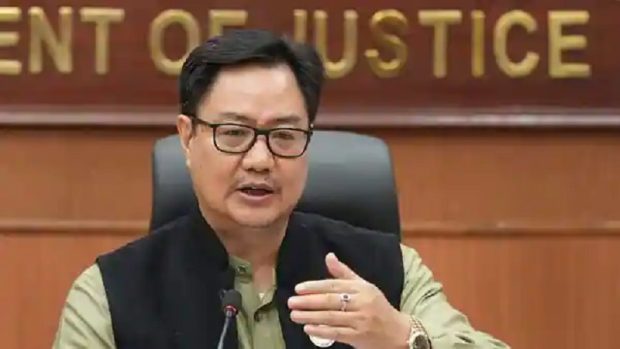
Differences between govt and judiciary doesn’t mean confrontation: Law Minister Kiren Rijiju
Team Udayavani, Mar 25, 2023, 4:36 PM IST

Chennai: Denying any clash between the government and judiciary as speculated in the media, Union Law and Justice Minister Kiren Rijiju on Saturday contended that differences were inevitable in a democracy but they should not be construed as confrontation.
The Minister inaugurated the Chief Judicial Magistrate court, Mayiladuthurai, in the presence of Chief Justice of India Justice D Y Chandrachud, Tamil Nadu Chief Minister M K Stalin and Acting Chief Justice of Madras High Court Justice T Raja here.
”We have differences, but it doesn’t mean there is confrontation. It sends a wrong message across the world. I want to make it clear that there is no problem between different organs of the State. There are signs of robust democratic actions, which are not a crisis,” he emphasised.
Pointing to some media reports of alleged differences between the government and the Supreme Court or the legislature and judiciary, the Union Minister said, ”we must understand that we are in a democracy. There are bound to be certain differences in terms of some outlook but you can’t have conflicting positions. This doesn’t mean confrontation. We are the largest democracy in the world.”
The Centre would support the Indian judiciary to be independent, he said, and called upon the bench and the bar — being two sides of the same coin — to work together to ensure that the court complex is not divided. ”One can’t exist without the other. Court must have proper decorum and conducive atmosphere.” He further said, ”everybody can’t think alike.”
” We are not ruled by a dictatorial king, so the difference of opinion can’t be termed as a crisis in Indian democracy. We can criticise each other but when it comes to national interest we must be one,” he stressed.
His Ministry was involved in developing a common core vocubaulary where Indian languages will have certain common usages, purely technical in nature, soon, to ensure that common people receive orders in their respective languages. Lauding the courts in Tamil Nadu for their excellent performance during the pandemic in delivering justice to the people, he said judicial infrastructure in Tamil Nadu was comparatively better than in many States in India. Recently, he visited Puducherry and found that the kind of work being done to improve the judicial infrastructure was possible only when the judiciary and government worked together in understanding the issues and tried to solve them.
Talking about fund allocations, he said last year the government had allotted Rs 9,000 crore for district and other courts in the State, and his department was pushing hard for utilisation of funds so that more could be sought. ”In some States, I realised that requirement of court and understanding of government has some shortcomings,” Rijiju said.
The government would like the Indian judiciary to go completely paperless in the near future.
”With the coming of technological support, everything can be synchronised so that the judge will not have to postpone cases for want of evidence, or bunch cases and other issues. Works are under process and I could sense we are going towards a major solution (for pendency),” he said.
There may be separation of powers between the executive and the judiciary but that did not mean they shouldn’t work together, the Law Minister asserted. ”We should work as a team to identify and ensure that challenges like pendency of cases are tackled,” he said, adding, ”In India, every judge is handling 50-60 cases every day. If I had to deal with so many cases, the mental pressure would be tremendous. That is why sometimes there is constant criticism that judges are unable to deliver justice, which is not true.” He pointed out that disposal of cases has been done faster. But the number of cases coming up was also higher. The only way was to have better infrastructure and better mechanism and to strengthen the Indian judiciary.
On delivering justice to common man, Rijiju said he would be happy to see all the courts in Tamil Nadu use the Tamil language in its proceedings. ”In the High Court there is a challenge…Tamil is a classical language and we’re proud of it. We would like to see it being used. With the increase in technology, advancement of legal transcripts, maybe some day Tamil language can be used in Supreme Court also,” the Minister said.
Udayavani is now on Telegram. Click here to join our channel and stay updated with the latest news.
Top News

Related Articles More

Notorious gangster wanted in UAPA case arrested at Nepal border

‘Condition critical’, say doctors as farmer leader Dallewal’s fast enters 27th day

ISRO to study how crops grow in space on PSLV-C60 mission

Vandalism at Allu Arjun’s residence in Hyderabad

PM Modi to attend Christmas celebrations hosted by Catholic Bishops’ Conference of India
MUST WATCH
Latest Additions

Kannada Sahitya Sammelana: Food distribution creates stir

Rohit gets hit in nets, practice pitches on slower side

India & Kuwait elevate ties to strategic level; ink defence pact after PM Modi meets top Kuwaiti leaders

In Kuwait, PM Modi meets yoga practitioner, other influencers from Gulf country

Notorious gangster wanted in UAPA case arrested at Nepal border
Thanks for visiting Udayavani
You seem to have an Ad Blocker on.
To continue reading, please turn it off or whitelist Udayavani.
















